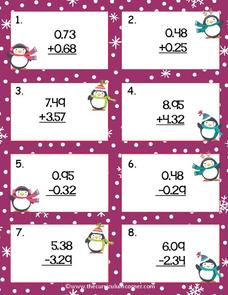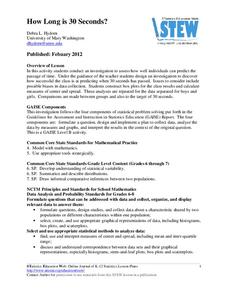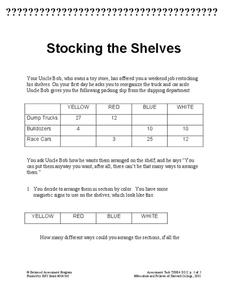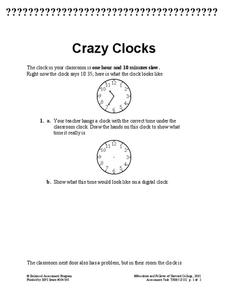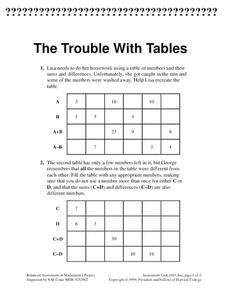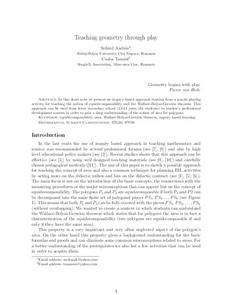WakeGOV
Plastic Sight Words
Plastic math? Have young learners count and name the number of plastic items in their centers. Kindergartners match sight word cards to the number of plastics in a given group, while learning that plastics come in all different shapes,...
American Statistical Association
Don't Spill the Beans!
Become a bean counter. Pupils use a fun activity to design and execute an experiment to determine whether they can grab more beans with their dominant hand or non-dominant hand. They use the class data to create scatter plots and then...
Curriculum Corner
Penguin Decimal Computation Scoot
Fourth and fifth graders use a set of 28 decimal computation cards as a way to practice adding and subtracting decimals. As learners move to the various cards placed around the room, they write the answer to each card on their recording...
Curriculum Corner
Winter Coordinate Grids
Young geometers identify the location of each icon by naming the ordered pair through a set of 10 winter-themed worksheets.
ReadWriteThink
Concept Map
When you think of one topic, related ideas and details invariably follow. That's concept mapping! Jot down ideas with a straightforward graphic organizer that works both electronically and as a printed resource.
American Statistical Association
How Long is 30 Seconds?
Is time on your side? Pupils come up with an experiment to test whether their classmates can guess how long it takes for 30 seconds to elapse. They divide the class data into two groups, create box-and-whisker plots, and analyze the...
Mascil Project
Circular Pave-Stones Backyard
Pack the lesson into your plans. Young mathematicians learn about packing and optimization with the context of circular paving stones. They use coins to model the paving stones, and then apply knowledge of circles and polygons to...
Scholastic
Organization Outline
Forming a strong organizational outline is important when reading a complex text, writing an informative essay, or analyzing a complicated problem. Use a straightforward organization outline to teach learners about concept mapping.
Concord Consortium
Hockey Pucks
Package design is a mathematical task for any business. Young scholars use a package design to determine the number of packages required for specific shipments. Using ratios, proportions, and fractions, they make decisions about the best...
Concord Consortium
Bricks for Books
Maximize a profit with an understanding of geometric dimension. A real-world task challenges learners to design a pattern using three different brick shapes. The bricks are dedicated with a different donation for each shape, so part of...
Concord Consortium
The Bus Route
Patterns are extremely helpful when solving a puzzle. Young scholars attempt to find times a bus will pass each stop. They identify a pattern in the known stop times to identify the solutions.
Concord Consortium
Summertopia
What if the unit of money changes tomorrow? Would you be prepared? Learners calculate currency conversions using fictional units of money. The fictional unit's base is 60 rather than 100, which can connect to time or even degrees.
Concord Consortium
Stocking the Shelves
How many ways can you stock a shelf? It's probably more than you think! Young scholars use data in a frequency table to determine how many ways to stock a shelf given a specific constraint for types of groups. They then repeat the task...
Concord Consortium
Crazy Clocks
While a stopped clock is right twice a day, a fast or slow clock confuses people for weeks. Scholars observe a clock running slow and must correct it before observing a clock running fast and working it backward. Finally, a multi-step...
American Statistical Association
EllipSeeIt: Visualizing Strength and Direction of Correlation
Seeing is believing. Given several bivariate data sets, learners make scatter plots using the online SeeIt program to visualize the correlation. To get a more complete picture of the topic, they research their own data set and perform an...
Concord Consortium
The Trouble with Tables
Tackle these tables. A performance task has learners complete two puzzles using addition and subtraction. They must fill in tables with missing addends, sums, minuends, subtrahends, or differences.
American Statistical Association
Exploring Geometric Probabilities with Buffon’s Coin Problem
Scholars create and perform experiments attempting to answer Buffon's Coin problem. They discover the relationships between geometry and probability, empirical and theoretical probabilities, and area of a circle and square.
Discovery Education
By the Foot: The History of Measurement
When is a foot not a foot? When you use the length of your own foot to measure distances, of course. To underscore the importance of standardized units of measurement, middle schoolers engage in a series of activities that ask them to...
American Statistical Association
How Random Is the iPod’s Shuffle?
Shuffle the resource into your instructional activity repertoire. Scholars use randomly-generated iPod Shuffle playlists to develop ideas about randomness. They use a new set of playlists to confirm their ideas, and then decide whether...
American Statistical Association
How Fast Are You?
Quick! Snap up the lesson. Scholars first use an online app to collect data on reaction times by clicking a button when the color of a box changes. They then plot and analyze the data by considering measures of center, measures of...
Mascil Project
Teaching Geometry Through Play
Puzzle your way through to a new understanding of area. Scholars learn about the area of polygons through equidecomposability, the idea that polygons that can be decomposed into the same set of pieces have the same area. By using...
Mascil Project
Building a Safe Staircase
Climb up the staircase of engineering knowledge. After watching a video of a carpenter measuring out steps for a set of stairs, pupils learn about the terminology and regulations involving stairs. They see how to use a rule of thumb when...
Mascil Project
Parachute Food Drop
Drop a perfect project into your lesson plans. Groups use different building materials to create models of parachutes for food drops. After testing out their prototypes, they make improvements to their designs.
Mascil Project
The Pipe Clamp
Clamp onto the resource and don't let go. Future mechanical engineers produce a pipe clamp from a sheet of metal. This idea is to use the pipe clamp to affix a pull-up bar in a doorway.




